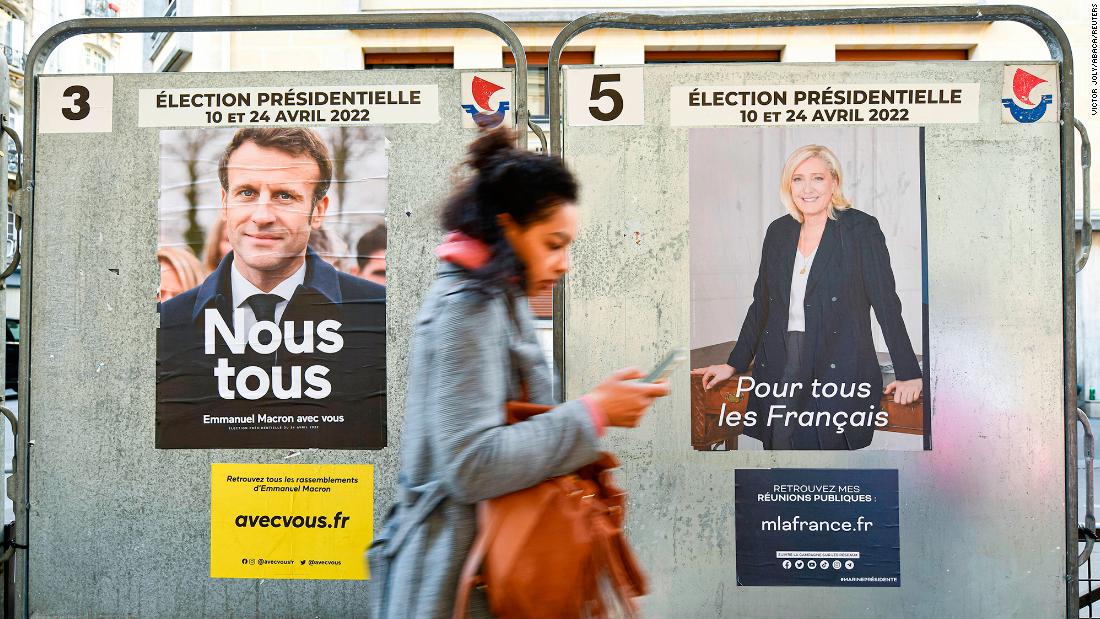

With polls indicating the presidential election is narrower than when the two candidates faced off in 2017, traders are girding for a surprise Le Pen win, which would rattle Europe’s second biggest economy as fears of a recession in the region grow.
“It could be bigger than Brexit. It could be bigger than Trump, if Le Pen prevails,” said Michael Hewson, chief market analyst at CMC Markets.
In research published on Tuesday, strategists at Citi put the probability of a Le Pen win at 35%. Still, they encouraged clients to hedge their bets on French government bonds, and cautioned that a Le Pen win would hurt stocks.
“Uncertainty stems from the risk of low voter turnout, as leftist voters refuse to give their vote to Macron, even at the risk of handing over to Le Pen,” they wrote. “Voter turnout is a factor that pollsters find particularly hard to forecast accurately.”
Victory for Le Pen would immediately raise questions about France’s political and economic ties to the European Union, even though she has dropped her pledge to take the country out of the bloc. Her policy goals — like stopping foreign workers from coming to France, which would end freedom of movement in Europe — could still create serious conflict.
“Most of [Le Pen’s] policies would not be possible inside the EU,” said Grégory Claeys, a senior fellow at Bruegel, a think tank in Brussels.
That could spark a “Frexit,” or French exit from the European Union “by accident,” he continued. If France, under Le Pen, pushed ahead with policies that broke EU law, he predicted there would be an exodus of capital as investors pull cash from the country, as when the United Kingdom voted for Brexit in 2016.
Economy front and center
“Wages, especially low wages, are not increasing by the same proportion as the increase in prices,” said Boris Plazzi, a board member of the Confédération Générale du Travail, a workers union with 700,000 members. “Therefore, there is a real concern on the part of workers.”
Le Pen has pledged to restore between €150 ($163) and €200 ($217) per month in household purchasing power by slashing taxes on fuel, reducing road tolls and cutting social benefits like subsidized housing for foreigners.
“Food and fuel prices have really dominated the day-to-day campaign,” said Mujtaba Rahman, managing director for Europe at Eurasia Group, a consultancy. “That’s one of the reasons she’s been so successful.”
But Macron criticized her plans in Wednesday’s debate, noting that it makes more sense to continue government policies that help the poorest, rather than pursuing less targeted measures like cutting fuel taxes.
He also highlighted the 1.2 million jobs created during his presidency, and said the government would maintain a temporary cap on electricity and gas prices, which has helped keep inflation lower than elsewhere in Europe.
If Le Pen wins
Scrutiny of Le Pen has increased since the first round, particularly over her past support for Russian President Vladimir Putin, and Macron remains the favorite. Eurasia Group thinks he has an 80% chance of reelection.
The effects of the United Kingdom’s vote to leave the European Union lasted longer. The British pound crashed, and still hasn’t recovered its level in June 2016.
Amundi, the French asset manager, told clients last week that it doesn’t recommend buying European stocks right now because of the war and economic uncertainty. The French election, it said, is another reason to stay away.
“Markets seem complacent about a Macron victory, even though the probability of a non-market friendly victory by Le Pen is not negligible,” Vincent Mortier, the chief investment officer, said in a note.
While Le Pen has reversed her previous proposal for France to leave the European Union, she’s still committed to reducing ties between France and the bloc by launching a series of referendums. If she does try to bar workers from other parts of the European Union from coming to France, or takes steps to impede the free movement of goods, it would still trigger fraught questions about the future of the country — and of the EU itself.
“Even though exiting the EU is not officially in the program, given the policies she wants to put in place, it would lead to a confrontation with European partners,” Bruegel’s Claeys said.
Much would ride on legislative elections in June, which would determine the strength of any Le Pen mandate.
“A win for Marine Le Pen would need to be followed by a strong showing for her party in June’s legislative elections if she is to implement most of her program,” said Jessica Hinds, Europe economist at Capital Economics.
If she needs to seek out a broader coalition of support, it “would clip her wings, at least on domestic policy,” Hinds continued. “So a Le Pen presidency might be less radical than many investors fear.”
— Joseph Ataman and Elias Lemercier contributed reporting.